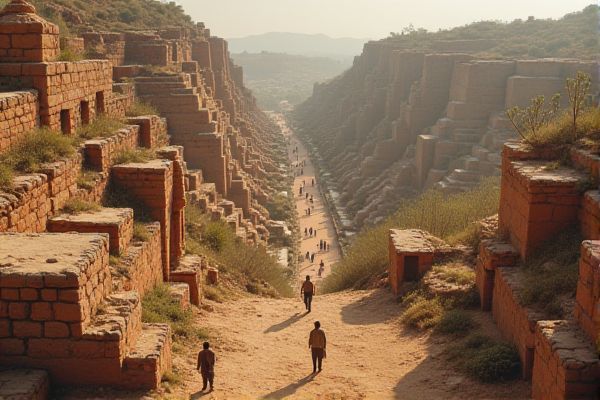
India offers a variety of job opportunities in archaeology, driven by its rich historical heritage and diverse cultural landscape. Government agencies such as the Archaeological Survey of India (ASI) regularly recruit archaeologists, field assistants, and researchers to engage in excavation, conservation, and site management projects. Universities and research institutions frequently seek qualified professionals for teaching and conducting research, which combines fieldwork with academic responsibilities. Various non-governmental organizations (NGOs) also provide avenues for employment in heritage management, public archaeology, and community engagement initiatives, catering to those passionate about preserving India's archaeological legacy.
Job Description
Archaeology jobs in India involve meticulous excavation and analysis of artifacts, structures, and cultural landscapes to understand historical narratives. Professionals in this field often collaborate with government agencies, museums, and educational institutions to curate historical exhibits or conduct research studies focused on India's rich heritage. Fieldwork may require skills in surveying, dating techniques, and laboratory analysis, alongside a passion for preserving the past. Opportunities for specialization include underwater archaeology, conservation, and cultural resource management, catering to various interests within the discipline.
Requirement
Archaeology jobs in India typically require a degree in archaeology, anthropology, or a related field. Experience in fieldwork, research, and familiarity with excavation techniques are often essential qualifications. Familiarity with local history and culture can enhance your job prospects and effectiveness in this role. Proficiency in data analysis and the use of various archaeological tools is also highly valued in the competitive job market.
Salary and Perks Expected
Archaeology jobs in India typically offer a salary range between Rs20,000 to Rs60,000 per month, depending on experience and qualifications. Government positions may provide additional benefits, including job security, pension plans, and allowances for travel and research expenses. Private sector roles often come with opportunities for fieldwork and international projects, enhancing your professional profile. Pursuing specialized certifications or advanced degrees can further increase earning potential and open doors to higher-level positions in this field.
Similar Job Names
- Archaeologist
- Field Technician
- Conservation Specialist
- Heritage Manager
- Museum Curator
- Research Scientist
- Cultural Resource Manager
- Site Supervisor
- Excavation Director
- Archaeological Illustrator
- GIS Specialist
- Academic Researcher
- Lecturer in Archaeology
- Archaeological Conservator
- Excavation Assistant
- Research Associate
- Archaeological Surveyor
- Project Officer
- Laboratory Analyst
- Artifact Analyst
Job Expectation Concept
Archaeology jobs in India often involve conducting field surveys, excavations, and research related to ancient cultures and historical artifacts. Professionals in this field are expected to have a solid understanding of various archaeological techniques and analytical methods, as well as an appreciation for India's diverse heritage. You may find opportunities in government organizations, museums, universities, and private consultancies focused on preserving India's rich archaeological heritage. Collaboration with local communities and stakeholders is important for ensuring that work is culturally sensitive and promotes public awareness of archaeological significance.
Career Advantage and Weakness
Archaeology jobs in India offer a unique career advantage by allowing you to explore the rich cultural heritage and history of the country. The opportunity to work in diverse environments, from ancient sites to museums, enhances your understanding of historical contexts and promotes heritage conservation. However, the field of archaeology in India faces challenges such as limited funding and competition for positions, which can impact job stability and growth. Gaining specialized skills and pursuing academic qualifications can significantly improve your prospects in this rewarding yet demanding field.
Important Thing Must Know
Archaeology jobs in India offer diverse opportunities, ranging from field research to museum curation. Many positions require a degree in archaeology or a related field, emphasizing the importance of formal education for career advancement. Practical experience through internships or fieldwork can significantly enhance your employability in this competitive job market. Organizations such as the Archaeological Survey of India (ASI) and various universities regularly seek skilled professionals for excavation projects and research initiatives. Staying updated with archaeological methods and technologies can further improve your prospects in this dynamic field.
Alternative Career Options
Archaeology jobs in India can lead to various alternative career paths beyond traditional excavation and research roles. You may consider positions in cultural resource management, where the focus is on preserving archaeological sites and heritage conservation. Teaching and academia offer opportunities to share your knowledge and inspire future generations about India's rich history and archaeology. Moreover, engaging in museum curation allows you to work with artifacts and educate the public about archaeological findings, making a significant impact on cultural preservation.
Companies List
- Archaeological Survey of India (ASI)
- Archaeological Exploration and Excavation Corporation
- Indian Heritage Forum
- National Museum Institute
- National Council of Educational Research and Training (NCERT)
- INTACH (Indian National Trust for Art and Cultural Heritage)
- State Archaeology Departments
- Private Museums and Galleries
- Research Institutions and Universities
- NGOs focused on heritage conservation
List of Ideal City
Cities such as Delhi, Varanasi, and Ahmedabad offer promising opportunities for archaeology jobs in India. Delhi, with its rich historical heritage, houses numerous archaeological sites and research institutions. Varanasi, known for its ancient temples and cultural significance, attracts scholars and researchers focusing on excavation and preservation. Ahmedabad, a UNESCO World Heritage City, provides avenues for urban archaeology and heritage management, making it a vibrant location for professionals in the field.
 jobs-india.net
jobs-india.net